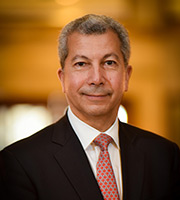“Conscious Mentoring” – by Roger Juan Maldonado

President’s Column, March 2019
I have recently been engaged in discussions with colleagues at my firm and at the New York City Bar Association regarding the role that partners and experienced attorneys should play in mentoring newer attorneys in their firms, corporations, and organizations, especially when, as is true for me, the experienced attorneys plan on continuing to work actively in their organizations past the once-expected retirement age of 65.
I enjoy the practice of law as a commercial litigator. I look forward to arguing motions and appeals and examining witnesses at trials, depositions, and hearings. I hope to continue to do so for some time to come. But for each such experience I have, there is a less-experienced lawyer in my firm who will not get the chance to conduct the argument or examination. Although there is much that an associate can learn from assisting a partner to prepare for an appeal or watching a partner cross-examine a witness, there is no substitute for being given the opportunity and responsibility to argue the appeal or examine the witness on one’s own.
So, when is it appropriate for lawyers of my generation who are still actively practicing to cede the “starring role” to an associate who has not yet argued an important appeal in federal or state court? How do we explain the determination to do so to the client who is expecting our firm to do the best it can to achieve the best result attainable? And how do law firms whose partners are primarily white males ensure that a diverse group of up-and-coming associates gets these opportunities?
The answers to these questions all begin with the requirement for partners and senior attorneys to always be looking to provide each of the younger attorneys in their firms and organizations the support and opportunities they need to succeed. This means spending time (that we may not be able to bill) to show younger attorneys what must be done to prepare for a hearing or oral argument. It means that we must bring these younger attorneys to client meetings and let them take responsibility for at least part of the presentation.
The idea is to do what is necessary so that the client wants us to give the younger attorney the opportunity to argue in court and conduct the examination because it will be more efficient economically and just as likely to achieve a good result. We should be looking to ensure that once we do decide to retire or greatly reduce our practice, there already is in place a cadre of attorneys who are well-qualified to take our places.
There is much we can do at the City Bar, as well. The City Bar’s Professional Development Workshop Series and its Associate Leadership Institute are two programs designed to help lawyers transition to more senior roles, with the latter program – run by our Office for Diversity and Inclusion – recently receiving the 2018 ABA Partnership Award. Further, I was delighted to hear from one of our committee chairs that his committee dedicates a meeting each year to “Mentor/Mentee Day,” where the mentee makes a presentation to the committee. We’ve made it easier than ever for younger lawyers to join a committee by expanding affiliate committee membership (which allows a committee to have one voting and one non-voting member from the same organization). Our committee chairs should be looking for opportunities to appoint junior and diverse members of their committees to lead subcommittees that will organize programs or draft reports.
I encourage partners and senior attorneys who are City Bar members to bring their newer lawyers to events here and to support their efforts to become engaged themselves. I was pleased to see that when former Secretary of Homeland Security and longtime City Bar member Jeh Johnson spoke here last fall, he did just that.
Above all, in bringing along the next generation of lawyers, particularly ones about whom we may have blind spots, it comes down to each of us. We need to put our minds to cultivating mentorship and sponsorship of our less experienced colleagues. It requires a kind of vigilance, a patrol of one’s mind, if you will, for unconscious bias and for self-interest that may lead us to put our own status and placement ahead of the advancement of our more junior colleagues. Because if we don’t pay attention to this, we will do a great disservice to the profession and to those who will represent the profession twenty years from now. Each of us must accept that a significant part of our proper role is to engage continuously in “conscious mentoring.”
Roger Juan Maldonado is President of the New York City Bar Association.

